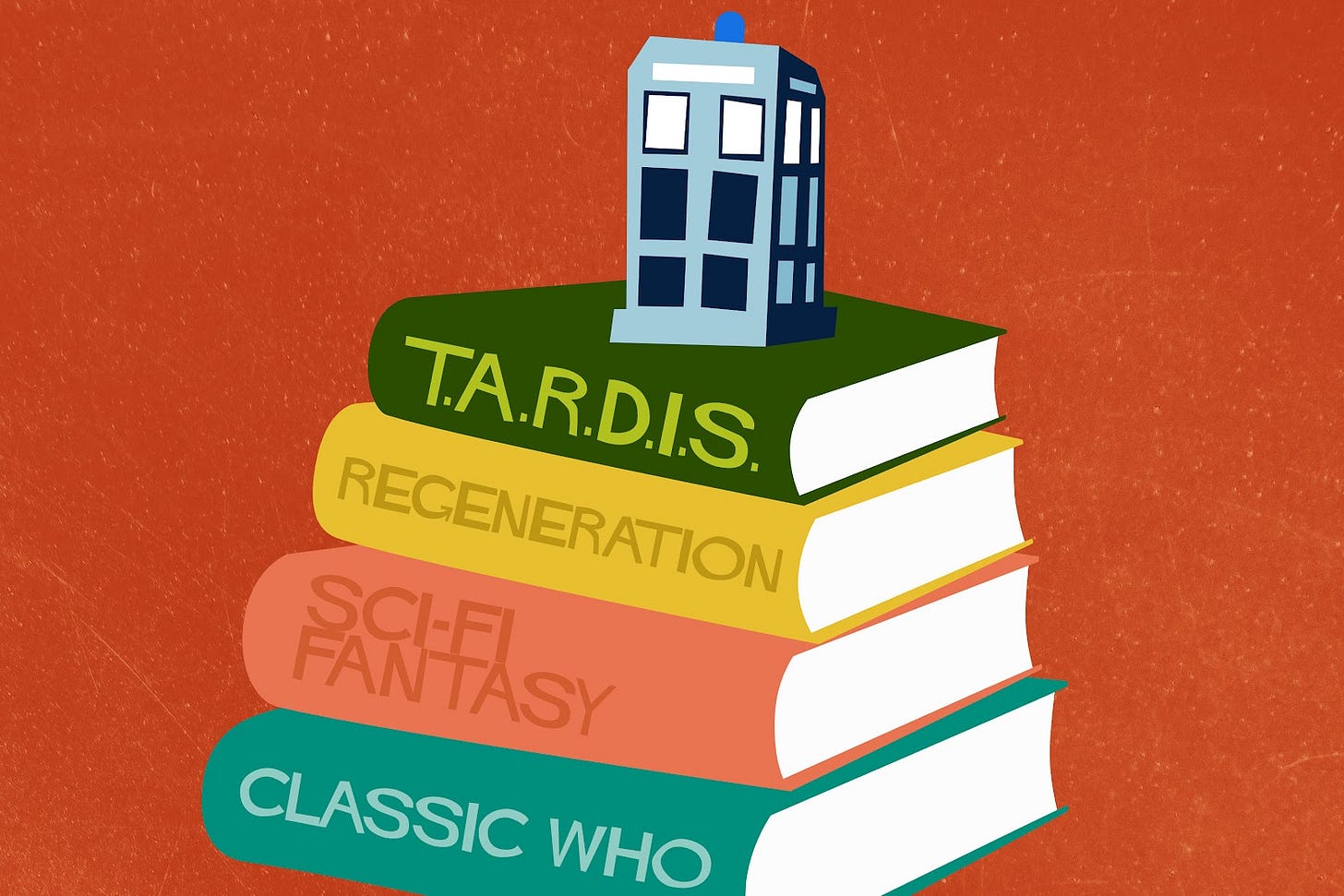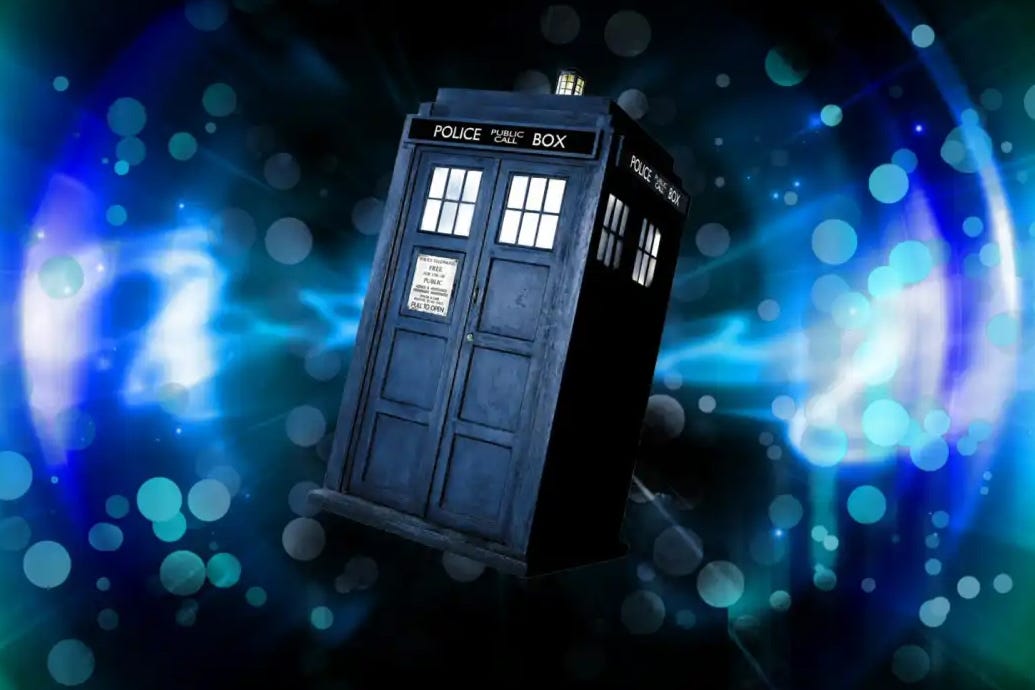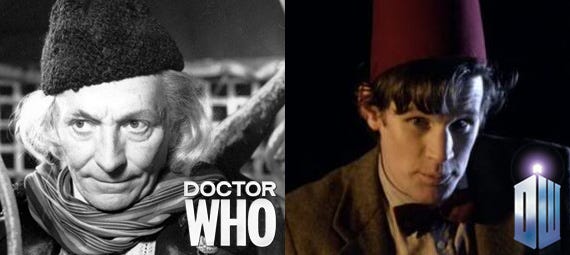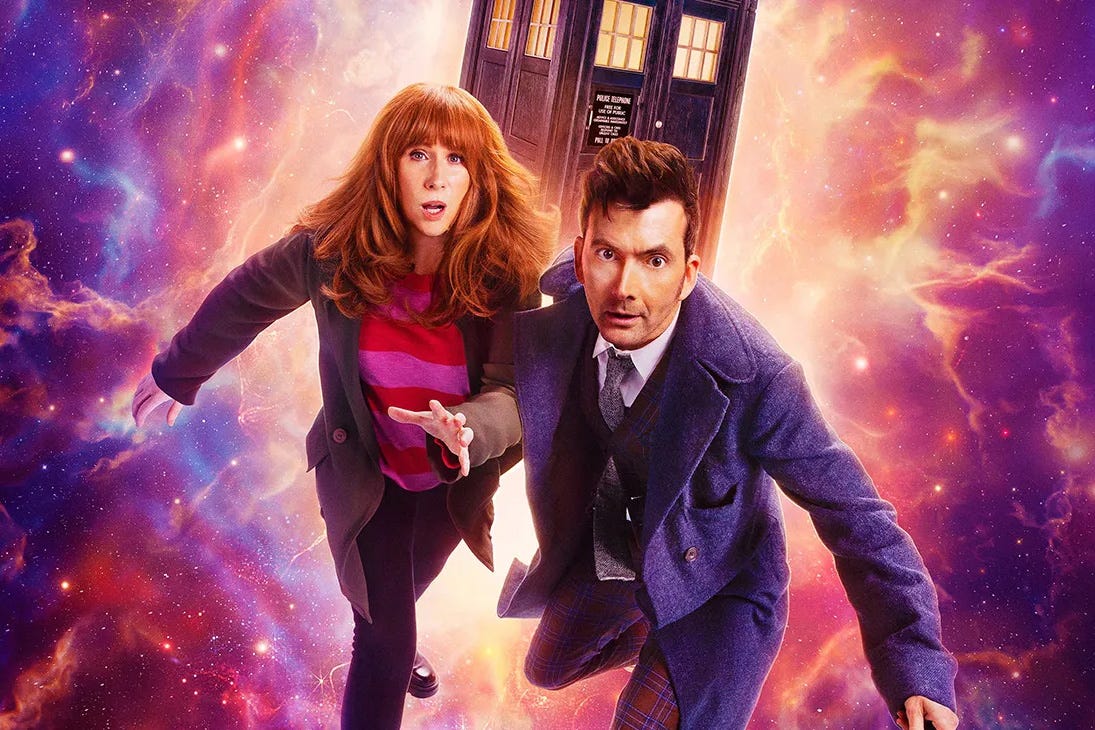New to Doctor Who: A Guide for People Who Finally Want to Watch
A newbie consults a fan for tips on getting into the Whovian universe
I don’t quite remember the first time I heard the name Doctor Who, or if I even realized what anyone was talking about. Doctor…what? Doctor…who? Oh–it’s called Doctor Who? It’s a TV show, ok. Wait, and there’s…time travel ⏳? But the logo for the show is a police box 👮♂️; and it looks decidedly British 🇬🇧. What am I missing here?
A self-proclaimed novice in the world of science fiction 👽 and fantasy 🧙♂️, I am constantly being exposed to long-living franchises that are beloved by millions of fans over decades that I’ve simply never heard about (my confusion was similar to the above when I’d finally discovered the existence of Game of Thrones and Lord of the Rings, much to the chagrin to lots of my fellow well-read friends). In recent years, I’ve discovered that so many people around me are huge fans of Doctor Who, but to be honest I had no idea what it was really about. But because I’ve always taken a huge interest in big moments in popular culture, when I heard that this month the show is celebrating its 60th Anniversary, I had to learn more. Sixty years?! Clearly I’ve missed something big.
At Remarkist, one of the foundational tenets of fandom we have discovered is that the best people to help you immerse yourself in a show or fandom you’ve never experienced is…fans. Fans have a unique perspective 👀 when it comes to guiding newcomers to a franchise or fandom. So I did what any Remarkist would do before setting out on a journey: I asked a fan about why she loves Doctor Who. That fan is Emily Susan, who has contributed many pieces to rmrk*st Mag from Taylor Swift to Buffy. Emily is also taking part in a community-wide watch party series of Doctor Who happening at Remarkist currently; fans and newbies alike gather each week to watch together, and they’ve got a pretty robust discussion thread going on our Discord channel where they discuss the show in between watches.
After some preliminary Google searches 👩💻 about the show to orient myself on some of the basics, I asked Emily a few questions about her fandom. I started with the simplest question: why does she like Doctor Who? Emily told me she often seeks out content from the fantasy, sci-fi and historical fiction genres, so Doctor Who is right up her alley. She says that she “saw it as a kid on PBS” in the U.S. but that it was hard to find it for years after that, since the show is British. Ding ding ding! 🛎 One thing I know about fandom is that nostalgia often plays a role. We often get excited about the shows and movies we loved as kids, and this nostalgia is exacerbated by the fact that the shows some generations watched as children or teens simply haven’t been available to watch again until now (it’s why rewatch podcasts for shows from the 90s are all the rage). We tend to forget that streaming services where we can find virtually anything at any time is still a relatively new concept. And finding other fans in the world 🌎 who love the same things you love is much, much easier with the Internet. “It wasn’t until I was in England at 18 that I met others who also enjoyed the show since it was not available in the U.S.,” Emily says.
“When I found out Doctor Who was being revived in 2005, I immediately had to watch and was not disappointed.” This is something that as a newbie to the series, is intriguing to me: a revival of a beloved series isn’t always a slam dunk 🏀. It’s satisfying to know that fans are thrilled with a revival of an older show.
But back to the question: What is it about Doctor Who that fans love? Emily says, “To me, the show is the perfect blend of sci-fi, fantasy, drama, comedy, and romance…the storytelling can seamlessly blend all my favorite genres together in such compelling ways. It explores a wide range of themes, including morality, ethics, and the consequences of one’s actions.” I can understand why these traits are appealing. Hitting so many genres at once is a good recipe for finding fans who like all kinds of content.
But there’s even more to it: “I love how from the first episode the Doctor truly wants to make the universe a better place…[and] must make many sacrifices along the way,” Emily says. “I also love how the Doctor travels with regular people and helps them to see how incredible they are and become, in his words, ‘The Stuff of Legends.’” She says the show “takes ordinary people with diverse backgrounds and personalities and reinforces the idea that anyone, regardless of their differences, can play a significant role in shaping the world.” Who can argue with a hero who wants to find good in everyone and everything?
So how do I start watching? I ask Emily what she would say to someone who has never watched a single episode, and how she would prepare them. She says, “I usually tell them to go in with an open mind. The show had a very limited budget when it was brought back so the production team had to do a lot with very few effects available. It also can be very campy at times but the acting and writing are so strong that I believe if they give it a chance and keep going, those two things aren’t as apparent. ‘Classic’ Who, the first 26 years of the show, is also a product of its time so there will be some cheesiness in how certain things look and act. Again though, I believe the amazing acting and writing make the show work.” She also comments on the creativity of the show, since the Doctor and companions encounter so many different worlds and adventures over so many years.
To start, Emily gives me some basic information: “The Doctor steals a spaceship called the TARDIS (Time and Relative Dimension (s) in Space) in order to travel and explore space. Along the way, The Doctor is aided by various companions as The Doctor helps people in need, defeats enemies, and saves civilizations in our galaxy and beyond.” As a child of a Trekkie/Star Wars enthusiast (yes, you can be both, especially if you’re my dad), this sounds like standard sci-fi/fantasy to me.
Emily also explains the Regeneration concept to me, which I’d learned about from other fans. If you’re a fan, you can skip this part, but to other newbies (Who-bies? Newbie-Who’s? We’ll work on it…), here’s the gist: The Doctor is a Time Lord, an alien species that can regenerate into a new body when injured or dying. This concept helped the series get around casting longevity–and, as Emily says, gives the added bonus of giving the show “a new jolt of creativity and life because every actress and actor has a different way of portraying the role. It’s an absolutely genius move and so unique.”
I have to agree. And this is where I start to see those familiar threads 🧵that link all kinds of content regardless of an overt genre. I’m reminded of one of my fandoms from when I was a kid and young adult: daytime soap operas 📺🧼. One of the (often mocked) big tropes of soap operas is that characters can die and come back to life at seemingly any time; they can get plastic surgery, lose their memories, etc., and often these devices are used to replace actors who leave the shows or conversely give them longevity in some way. If an actor wants to move on, they can go into a coma and come out looking like a completely different person! If a character dies, that same actor can play their twin! While most shorter lived shows would make way for an actor to permanently leave or a character to be killed off, soaps always found ways to leave the door open for that character or actor to come back, or, in Doctor Who terms, regenerate.
As a newcomer to the series who is interested to start watching, does it matter where I begin? Emily says, “It really depends on if someone wants to get into Classic Who at all” since the older original series isn’t as readily available to watch as the newer series is. (I’m also catching onto some fandom-speak: Classic Who vs. New Who.) “I saw a big chunk of New Who before I was able to go back to the beginning. It is not needed to understand New Who, but I wanted to see as much as I could once it was available online in the U.S. The other entry point that I feel is best in terms of understanding where Doctor Who is now is Series One of New Who with the Ninth Doctor, played by Christopher Eccleston.” I make a mental note 💬📝 to start there.

I also am charmed by Emily’s use of “New Who” versus “Old Who.” Fandoms have their own language around the canon of any content, and this totally plays into how fans have discussions. In the Swiftiverse, we refer to anything “TV” as being “Taylor’s Version,” meaning, her album re-records. In the Gilmore Girls fandom we always differentiate between the original series and AYITL (Gilmore Girls: A Year in the Life, the series’ movie sequels). Fans decide how to codify canon versus not, and surely get into lively debates about what constitutes canon. But a shared fandom language helps them have these conversations.
And what about demographics? Who is this show actually for? Emily explained that one of the best things about the series is that it appeals to all ages. She tells me, “When the show was originally conceived in 1963, the use of time travel was meant to be educational by exploring different times in history and scientific ideas.” As a person who is usually glued to the History Channel and history podcasts, she’s now said the thing that has me hooked! Plus, one of my favorite movies of all time is Back to the Future, and I have long-loved a good mind-bendy time travel narrative. (I’m also a huge fan of The Lake House, cheesy as it is!)
So, roll call: We’ve got time travel, regeneration, history education, and ordinary folks seeing greatness in themselves. On these tenets, it feels like I’d be a giant Doctor Who fan. And I do plan to start watching, and maybe join the community watch happening at Remarkist.
When I asked Emily where she goes to discuss the show with other fans (besides the Remarkist Discord channel), she says that she listens to a lot of “Whovian” podcasts for interviews and information, like Galactic Yo-Yo, The Writer’s Room, Verity!, and Radio Free Skaro as well as YouTube destinations like WhoCulture, and The Confused Andipose, as well as the official Doctor Who Youtube Channel. She also tells me that she listens to the audio dramas by Big Finish Productions. “They are responsible for keeping Doctor Who stories going when the show was not airing on television. Several of the actors and actresses from the television show voice their characters and others. They’re incredible and add a lot of amazing details to Doctor Who’s history.” I am a lover of multimedia, and it’s always fascinating to me that stories can exist in several different mediums to make up a world of storytelling content. I’m so thrilled at Emily Susan has given me so much to get excited about!
With the 60th Anniversary specials upon us, a three-episode extravaganza released on Disney+, you might, if you’re a newbie like me, wonder how to prepare. I consulted our Doctor Who discussion thread on our Discord channel for clues. Sure enough, user @sheevsenate posted some helpful tips for folks there: He says, “You’ll need to watch S4 (2008) plus the final two S4 (2010) specials (‘The End of Time,’ Parts 1 & 2)....You could feasibly skip S3, but to know the characters (Donna and the Noble family we first met in ‘The Runaway Bride’ Christmas special at the end of S2) in the 60th Anniversary specials (and why you care about them) you’ll need to watch S4 plus ‘The End of Time’ two-parter at a minimum.” So, it looks like my work is cut out for me before I get to those anniversary specials. But if the show has stuck around for sixty years, it seems it might be here to stay and there’s no real rush. I can savor the show just like the die-hard fans have for generations.
Subscribe for fandom content that we are loving and celebrating at Remarkist every day! We are celebrating the 60th Anniversary of Doctor Who all month, so check back here for more content about this beloved franchise and follow our Doctor Who Instagram. You can use our app to schedule watch parties around tv shows & movies, and in the meantime, find us on Instagram, tumblr, and Spotify!








